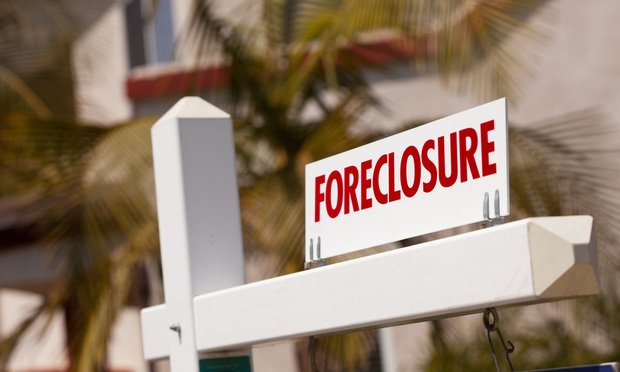Pa. Supreme Court Provides Guidance on Authenticating Mortgage Records
A mortgage company seeking to authenticate loan documents recorded and transferred between prior companies does not need to have employees from each of the prior loan holders testify in court to authenticate the information, the Pennsylvania Supreme Court has ruled, providing guidance on an issue that is increasingly coming before the courts.
March 28, 2019 at 04:26 PM
4 minute read
 Photo: Shutterstock
Photo: Shutterstock
A mortgage company seeking to authenticate loan documents recorded and transferred between prior companies does not need to have employees from each of the prior loan holders testify in court to authenticate the information, the Pennsylvania Supreme Court has ruled, providing guidance on an issue that is increasingly coming before the courts.
The justices ruled Thursday that loan records can be authenticated solely through the testimony of an employee from the current loan holder. The court's unanimous decision in Bayview Loan Servicing v. Wicker declined to adopt a bright-line rule either mandating or barring the additional testimony, but instead said it should be up to the trial courts to determine whether the loan information and the employee's testimony are trustworthy enough to authenticate the disputed documents.
“We will continue to allow our trial courts to utilize their broad discretion in evidentiary matters by applying the business record exception of Rule 803(6) and the Uniform Business Records as Evidence Act to determine if the witness 'can provide sufficient information relating to the preparation and maintenance of the records to justify a presumption of trustworthiness' subject to the opponent rebutting the evidence with any other circumstances indicating a lack of trustworthiness,” Justice Max Baer said in the court's 21-page opinion.
The dispute stems from a mortgage defendants James and Beryl Wicker signed for property in Punxsutawney in 2008 with Mortgage Electronic Registration Systems (MERS) acting as nominee for Countrywide Bank. The mortgage was assigned to Bank of America.
BOA filed a mortgage foreclosure action in 2012, alleging the defendants defaulted in 2010 and were given the required notice in 2011. The mortgage was subsequently assigned to Bayview Loan Servicing in June 2015.
The case went to trial in August 2015, and the company presented only one witness, Terrence Schonleber, who was a litigation manager for Bayview. Schonleber's testimony was used as the basis to authenticate the underlying business records. Counsel for the Wickers, however, objected, contending that the testimony was hearsay since Schonleber did not create the records, the records did not originate with Bayview and because he had never worked for BOA.
In an attempt to provide foundation for the testimony, Schonleber said Bayview and BOA used the same mortgage platform, that he was familiar with the Wickers' records and that the two companies had worked together to safeguard against errors in the records.
The trial court, however, determined that the testimony was sufficient to authenticate the records, and the Superior Court affirmed that ruling.
On appeal to the Supreme Court, the Wickers contended that the business records exception does not allow a business records custodian to authenticate documents containing statements by people who are not employed by the business, and that the trial court and Superior Court rulings diverged from prior Superior Court decisions U.S. Bank v. Pautenis and Commonwealth Financial Systems v. Smith.
The Wickers and several amici further contended that allowing in the records was problematic because they often contained errors.
Baer, who called the dispute an “increasingly common situation,” reviewed the history of the business record exception and determined that Pautenis and Smith presented factually different scenarios because in those cases, either the testifying witness did not have sufficient knowledge about how the records were recorded or the documents were not trustworthy.
Ultimately he agreed with the trial court and the Superior Court, finding that Schonleber's testimony was sufficient to authenticate the documents.
Bayview's attorney, Harry Reese of Powers Kirn & Associates, said these disputes are often the main point of contention for mortgage suits that make it to trial. Courts, he said, have also often looked to Pautenis and Smith when considering these issues, so confusion can arise.
“It should inform [the trial courts] that they can let the records in if the subsequent servicer-witness has the requisite knowledge and the records are not untrustworthy,” Reese said.
Daniel Pallen of Media represented the Wickers. He returned a call for comment Thursday afternoon after having been in court, and said he declined to comment until he had a chance to fully review the opinion.
This content has been archived. It is available through our partners, LexisNexis® and Bloomberg Law.
To view this content, please continue to their sites.
Not a Lexis Subscriber?
Subscribe Now
Not a Bloomberg Law Subscriber?
Subscribe Now
NOT FOR REPRINT
© 2025 ALM Global, LLC, All Rights Reserved. Request academic re-use from www.copyright.com. All other uses, submit a request to [email protected]. For more information visit Asset & Logo Licensing.
You Might Like
View All

Pennsylvania Law Schools Are Seeing Double-Digit Boosts in 2025 Applications
5 minute read
Pa. Defense Firm Sued by Client Over Ex-Eagles Player's $43.5M Med Mal Win
3 minute read
Am Law 100 Lateral Partner Hiring Rose in 2024: Report
Trending Stories
- 1Veritext Legal Solutions Announces the Past Acquisitions of Three Alternative Dispute Resolution Firms
- 2Sarno da Costa D’Aniello Maceri LLC Announces Addition of New Office in Eatontown, NJ, and Named Partner
- 3LSU General Counsel Quits Amid Fracas Over First Amendment Rights of Law Professor
- 4An Eye on ‘De-Risking’: Chewing on Hot Topics in Litigation Funding With Jeffery Lula of GLS Capital
- 5Arguing Class Actions: With Friends Like These...
Who Got The Work
J. Brugh Lower of Gibbons has entered an appearance for industrial equipment supplier Devco Corporation in a pending trademark infringement lawsuit. The suit, accusing the defendant of selling knock-off Graco products, was filed Dec. 18 in New Jersey District Court by Rivkin Radler on behalf of Graco Inc. and Graco Minnesota. The case, assigned to U.S. District Judge Zahid N. Quraishi, is 3:24-cv-11294, Graco Inc. et al v. Devco Corporation.
Who Got The Work
Rebecca Maller-Stein and Kent A. Yalowitz of Arnold & Porter Kaye Scholer have entered their appearances for Hanaco Venture Capital and its executives, Lior Prosor and David Frankel, in a pending securities lawsuit. The action, filed on Dec. 24 in New York Southern District Court by Zell, Aron & Co. on behalf of Goldeneye Advisors, accuses the defendants of negligently and fraudulently managing the plaintiff's $1 million investment. The case, assigned to U.S. District Judge Vernon S. Broderick, is 1:24-cv-09918, Goldeneye Advisors, LLC v. Hanaco Venture Capital, Ltd. et al.
Who Got The Work
Attorneys from A&O Shearman has stepped in as defense counsel for Toronto-Dominion Bank and other defendants in a pending securities class action. The suit, filed Dec. 11 in New York Southern District Court by Bleichmar Fonti & Auld, accuses the defendants of concealing the bank's 'pervasive' deficiencies in regards to its compliance with the Bank Secrecy Act and the quality of its anti-money laundering controls. The case, assigned to U.S. District Judge Arun Subramanian, is 1:24-cv-09445, Gonzalez v. The Toronto-Dominion Bank et al.
Who Got The Work
Crown Castle International, a Pennsylvania company providing shared communications infrastructure, has turned to Luke D. Wolf of Gordon Rees Scully Mansukhani to fend off a pending breach-of-contract lawsuit. The court action, filed Nov. 25 in Michigan Eastern District Court by Hooper Hathaway PC on behalf of The Town Residences LLC, accuses Crown Castle of failing to transfer approximately $30,000 in utility payments from T-Mobile in breach of a roof-top lease and assignment agreement. The case, assigned to U.S. District Judge Susan K. Declercq, is 2:24-cv-13131, The Town Residences LLC v. T-Mobile US, Inc. et al.
Who Got The Work
Wilfred P. Coronato and Daniel M. Schwartz of McCarter & English have stepped in as defense counsel to Electrolux Home Products Inc. in a pending product liability lawsuit. The court action, filed Nov. 26 in New York Eastern District Court by Poulos Lopiccolo PC and Nagel Rice LLP on behalf of David Stern, alleges that the defendant's refrigerators’ drawers and shelving repeatedly break and fall apart within months after purchase. The case, assigned to U.S. District Judge Joan M. Azrack, is 2:24-cv-08204, Stern v. Electrolux Home Products, Inc.
Featured Firms
Law Offices of Gary Martin Hays & Associates, P.C.
(470) 294-1674
Law Offices of Mark E. Salomone
(857) 444-6468
Smith & Hassler
(713) 739-1250





